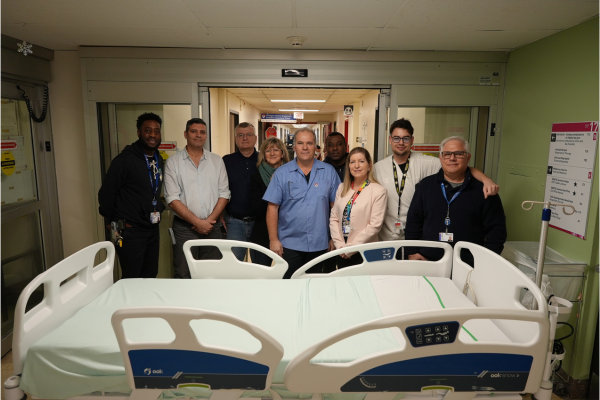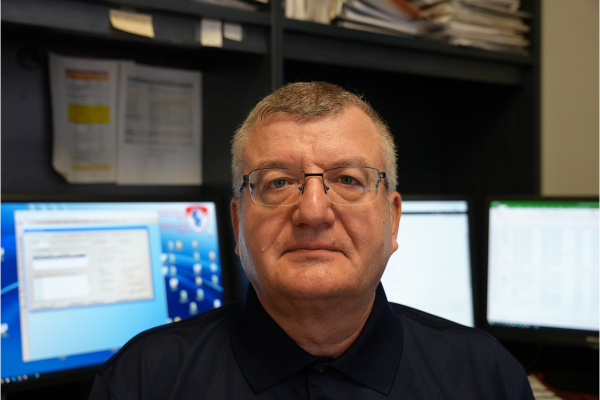Teamwork showcased in hospital bed rollout
The Montreal General Hospital is getting new beds in all its medical-surgical departments. Deliveries have been steadily arriving over the past six months to replace aging and broken beds and more shipments are planned for later this year. Nursing Practice Consultant Kim Tanguay helped coordinate the clinical deployment. “I think the real success of this project is the collaboration between departments. There were multiple steps and numerous teams involved from the Biomedical department who lead the acquisition, to the nurse managers not to mention transport, housekeeping and, of course, Nurse Sylvie Ampleman, who supported the project,” she says proudly.

Project running like a well-oiled machine
Hospital bed replacement is a big undertaking. It starts with identifying needs, and planning and budgeting, then comes researching options and vendor selection, followed by installation and set-up, training, and the list goes on. The final tally was 240 beds – 220 for the MGH and 20 for the Neuro. The sheer size of the project meant several MUHC departments played a role.
When the first shipment arrived at the loading dock, the teams sprang into action. Biomed was first on the scene to check for defects and damage. Then housekeeping cleaned and made the beds so they were ready for deployment. On deployment day, the departments getting new beds provided a list of patients and the exchange began. Transport delivered the beds, the old bed was wiped down, brought back to the holding area and cleaned by housekeeping.
Back and forth the operation went, 10 beds at a time, until the new ones were in place and the old ones collected. “It was incredible to see the teams in action. Biomedical, housekeeping, transport and the clinical team all worked together to make this deployment as smooth as possible,” says Kim. “I was most struck with feedback from the transport team who say it is easier to move patients in the new beds- they are lighter and more ergonomic. They also fit more easily in the elevator.”
MGH 17 plays pivotal role
Hospital beds have an average life span of 20 years. Once they reach the end of their service life, there is limited or no support from the manufacturer- and this poses its own set of challenges. “We had many beds that were broken and because of COVID it was complicated to get pieces. Support was ending. So, we pushed the gas pedal on this project,” says Virgil Matesan, Chief Manager, Biomedical Engineering at the MUHC.

Once the project got the green light, the priority was to find a large enough area to temporarily house the beds – new and old. The 17th floor at the MGH became the holding site for the new beds and the storage area for the old ones.
Old beds diverted from landfill
The beds being replaced are aging, but some still function and are in demand. “We can’t guarantee how long they will last, but more than half can still be used,” explains Virgil. “Some other MUHC hospitals, including Lachine, have expressed an interest in acquiring these beds in the short term. They won’t be sent anywhere without being thoroughly checked by our technicians.” The MUHC-i-SIM collects and uses expired materials and decommissioned equipment. “This includes stretchers and hospital beds that can no longer be used for patients, but are functional for use in a teaching environment,” adds Caroline White, Simulation Specialist Advisor. “Before equipment is disposed of it can be offered internally where it will gain a new life.” The centre will receive three beds.
Another Quebec healthcare institution has also reached out to take any unwanted beds, even the broken ones – to use for parts. “This is good news - they won’t end up in the landfill,” says Virgil.
“It’s a great example of positive action in sustainable development,” says Marie-Christine Chartier, Assistant to the Director - Sustainable Development and Performance. “All initiatives aimed at reusing products that are still usable or extending their lifespan are essential to reduce the negative impact on the environment,” she adds.
New beds are made in Quebec
Quality, reliability, warranty, and vendor reputation were all factors in choosing a manufacturer for the new beds. Umano Medical, a Quebec based company, secured the contract. “Purchasing locally is a great way to operate sustainably,” says Marie-Christine. The MUHC has a comprehensive Sustainable Development policy. “The more we select products that are made closer to home, the greater benefits to the local economy. In addition, we reduce greenhouse gas emissions associated with transportation,” she notes.
A huge thank you to the teams for their considerable effort and dedication to improve the patient experience at the MGH and beyond!